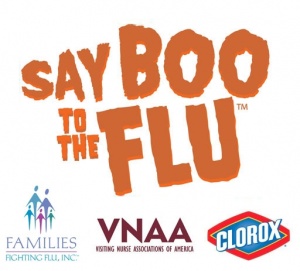October 20th, 2008 by Dr. Val Jones in Patient Interviews
No Comments »
 Most people assume that the flu is an inconvenience – an infection that causes a week of fevers, body aches, and discomfort. But it can be far more serious than that. In some cases, the virus can be fatal. I interviewed Joe Lastinger about the tragic loss of his 3 and-a-half year-old daughter to influenza. You can listen to our interview here.
Most people assume that the flu is an inconvenience – an infection that causes a week of fevers, body aches, and discomfort. But it can be far more serious than that. In some cases, the virus can be fatal. I interviewed Joe Lastinger about the tragic loss of his 3 and-a-half year-old daughter to influenza. You can listen to our interview here.
Dr. Val: I’m so sorry to hear about your daughter’s death from influenza. Can you tell me a little bit about the events that led up to it?
Joe: The events were pretty unremarkable, until she died suddenly. Emily was three and a half at the time and had just started pre-school. One day she came home from school and she was very tired. She wanted to take a nap. Normally she didn’t take naps so we knew something was different. We took her to the pediatrician the next day and she was diagnosed with the flu. We were counseled to give her fluids, Tylenol and Motrin around the clock to control her fever, and to expect it to resolve in about a week.
However, Emily began experiencing more nausea a few days in. We contacted the pediatrician and she asked us a series of questions about her symptoms – but since she was urinating regularly, wasn’t having bloody vomit, or any other serious symptoms we were reassured. The next day my wife was in the kitchen (near the bedroom where she had left Emily) and I heard her scream. She found Emily on the ground, not breathing. We called 911 and the paramedics were able to get her heart started. She was transferred to the local children’s hospital, and was intubated. Unfortunately there was never any sign of brain activity and they slowly maxed out all the drugs they were giving her to keep her alive.
Read more »
October 19th, 2008 by Dr. Val Jones in Expert Interviews
No Comments »

Even though I live in DC it was my first visit to the Department of State. I was surprised by the level of security (I passed through 2 metal detectors to get to the conference) and the multitude of languages spoken by the attendees. Many were wearing headphones, which were connected to a translator service. The lectures were rapidly translated into the various languages of the audience members (the way it would for the United Nations meetings), though I enjoyed the ability to listen directly to the speakers in my native tongue.
I was able to interview a keynote speaker, Joe Harford, Ph.D., the Director of the Office of International Affairs, of the National Cancer Institute. Here’s what he had to say:
Dr. Val: Why is the risk of breast cancer (in the US) greater now than in previous generations?
Dr. Harford: The main cause of the increase is related to changes in reproductive patterns within the population as a whole. Women who have fewer children (and later in life) tend to have higher risk of breast cancer. This is associated with hormones – the breast is a hormonally responsive organ and breast cells that convert to tumor cells also have hormone receptivity. Pregnancy and breast feeding are protective for breast tissue. Women can check out their risk for developing breast cancer by filling out this
short, online assessment tool at the NCI.
Read more »
October 18th, 2008 by Dr. Val Jones in Announcements, Humor
1 Comment »
I have been a fan of The Onion for many years. Its authors have mastered the art of news satire, and although they’re often irreverent, they’re equal opportunity lampooners. I always wondered what The Onion’s writers were like in person, and yesterday my wish to know them better came true at the National Press Club.
The writers are “20-30 somethings” with a wicked sense of humor and a healthy dose of self-confidence. They describe themselves as “schlubs” who have many “schlubby” friends. Most got their start working as reporters for small, midwestern newspapers. They dress casually and claim to be paid very little.
Of course, I bounced up to the panel as soon as the event was over and congratulated them on their science reporting and asked them to reveal to me who wrote the spoof article on medical peer review. It’s one of my favorite Onion articles of all-time, as it follows the science paper of a 5th grader (he wrote it about otters) as it undergoes peer scrutiny, shredding and denial for publication. You can read the article here.
Sadly, the panel members denied any memory of the otter article. I countered with my appreciation for their video news “Most Children Strongly Opposed To Children’s Healthcare” and they nodded politely. One writer asked me if I thought their scientific spoof articles were on-target, or if they betrayed their major lack of understanding of science in the first place.
“Well, as you writers well know,” I said, “‘science is hard.’ But you seem to be getting the right messages across. The medical community needs more reports like ‘Fifth Grade Science Paper Doesn’t Stand Up To Peer Review.’ There’s not much to laugh about in healthcare these days.”
I snapped a few photos of the mysterious authors for my fellow Onion fans. Do you have a favorite Onion article or headline?
P.S. When asked why the paper was called The Onion, one of the panelists said that the first team of writers were so poor they ate onion sandwiches to survive (eww), so they named the paper after their food of choice. The company currently employs about 30 people (20 for video production and 10 newspaper writers). Fortunately those present at the event did not seem to have onion breath.

Onion Breath Test
October 17th, 2008 by Dr. Val Jones in Friday Funny
5 Comments »
I’m introducing a new feature to the blog: a weekly cartoon posted every Friday. If you’d like to subscribe to the cartoon feed (perhaps you’d like to feature the weekly cartoon on your website?) please contact john.crotty@getbetterhealth.com
Enjoy your weekly dose of humor from Dr. Val! By the way, what time on Friday should I publish these do you think? I’d appreciate your feedback.

October 17th, 2008 by Dr. Val Jones in Patient Interviews
No Comments »

Deanna and Rebecca Sherman
As many as 15% of Americans have a blood disorder (called anti-phospholipid antibody syndrome – APS) that can increase their risk for blood clots and stroke. While these antibodies are especially common in people with certain auto-immune diseases like SLE (systemic lupus erethematosis – or “lupus”) quite a few people have them without ever knowing it. In fact, most people with APS remain asymptomatic their entire lives – but for an unlucky few, the disorder can cause devastating consequences.
I interviewed Rebecca Sherman about her recent stroke caused by APS. Listen to the podcast here.
Dr. Val: Tell me about the events leading up to your stroke.
Sherman: I was a young, healthy 32-year-old with no idea that I had anti-phospholipid antibodies in my blood. One morning when I was washing my face at my boyfriend’s house I suddenly noticed that one side of it was frozen. I was standing in front of the bathroom sink and I fell to the floor with the washcloth in my hand. I couldn’t walk or talk – the whole right side of my body didn’t do what I wanted it to do. So I threw the washcloth at my boyfriend’s head (with my left hand). Luckily my aim was good (he was asleep in bed) and the bed was near the door to the bathroom – the cold, wet object caused him to jump out of bed and find me. Read more »
 Most people assume that the flu is an inconvenience – an infection that causes a week of fevers, body aches, and discomfort. But it can be far more serious than that. In some cases, the virus can be fatal. I interviewed Joe Lastinger about the tragic loss of his 3 and-a-half year-old daughter to influenza. You can listen to our interview here.
Most people assume that the flu is an inconvenience – an infection that causes a week of fevers, body aches, and discomfort. But it can be far more serious than that. In some cases, the virus can be fatal. I interviewed Joe Lastinger about the tragic loss of his 3 and-a-half year-old daughter to influenza. You can listen to our interview here.














